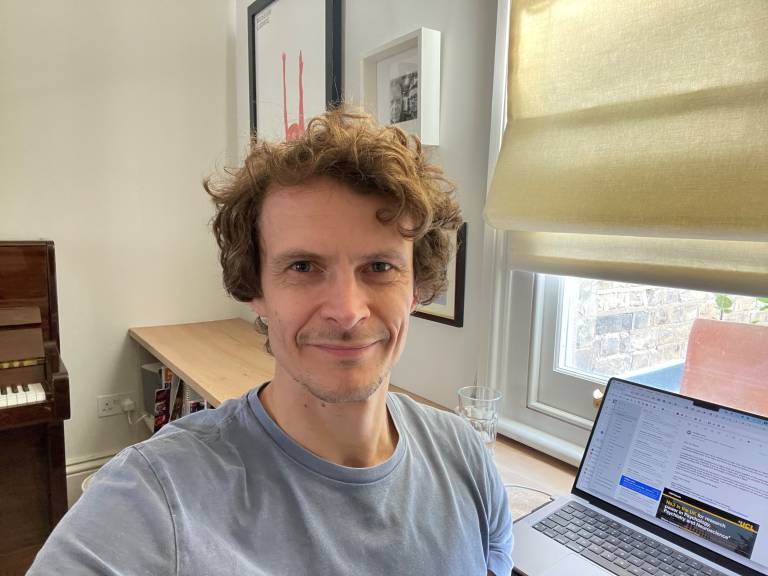Dr Rick Adams is a Future Leaders Fellow, in the UCL Department of Computer Science and the UCL Division of Psychiatry.

What is computational psychiatry and what attracted you to this area?
It involves various different things – in a nutshell it means computational methods applied to psychiatric problems.
But this can involve 1) making models of cognition, e.g. to understand hallucinations or delusions, 2) making models of imaging data, e.g. to try to infer neurobiological properties from brain imaging data, 3) using machine learning and ‘big data’ of all kinds to make models that can predict things like relapses in or optimal treatments for individuals.
I like 1) because it’s truly fascinating to think about how phenomena like delusional beliefs can arise in a computational ‘mind’, and hopefully this can illuminate their origins in real minds.
How can computational models help us better understand mental health?
Another aspect of computational psychiatry I like is that it is very rigorous and quantitative but it is not ‘reductive’, in that it doesn’t try to explain our complex mental phenomena in purely biological terms.
It understands the brain as a kind of biological computer, that is affected by its biology, but equally by its environment, its experiences, its own actions including how it seeks information, and how all of these interact. We have to understand these complex interactions to understand mental health, ultimately.
What do you think are some of the main challenges in understanding and treating mental health disorders? How can multi-disciplinary research help overcome these challenges?
There are huge challenges. First, the disorders are incredibly complex. Second, it is hard to be sure we are grouping people the right way, e.g. are all people with ‘depression’ sufficiently similar that studying them as a group is informative? But if we need to change the grouping, how should we do that?
Multidisciplinary research is really the only way to go if you think that disorders involve interactions between brains, experiences and environments etc: studying only one part of this interaction will give an incomplete picture.
Can you tell us about your work for the Camden Early Intervention in Psychosis NHS service and also the National Hospital for Neurology and Neurosurgery?
In Camden I saw patients during or following their first episode of psychosis. Many were coming to terms with a pretty major disruption to their lives. The aim of that service is to optimise the person’s recovery as much as possible and then slowly withdraw, hoping that we will never be needed again: it is great when that is the case.
In the NHNN I do a neuropsychiatry clinic which is quite different, seeing patients with neurological disorders plus mental health problems (such as epilepsy and psychosis, or Parkinson’s disease and depression) and also people with so-called ‘functional’ symptoms.
Do you think mental health problems are becoming more prevalent among young people, and if so, why?
I’m not an expert on this but there is a lot of debate about it online at the moment. The pandemic was a major stressor, obviously: isolation might have impacted younger people more. Some suspect that mental health of adolescents has declined since the advent of social media on phones. Others blame pornography, ideology, the political outlook… I haven’t seen convincing data on this but I’m not the best person to ask!
You were awarded a 2022 UKRI Future Leaders Fellowship to develop new ways of targeting drug treatments for schizophrenia. Can you tell us about this project?
In this project we are trying to use models of EEG data (‘brain waves’) to predict whether people with a schizophrenia diagnosis would respond best to a drug that boosts excitatory function in the brain, or a drug that boosts inhibitory function.
What working achievement are you most proud of?
Probably finally being able to start my own group at UCL! But also the Computational Psychiatry course (and now, a conference) that Dr Xiaosi Gu and I co-organise has been popular since we started it in 2014, and I was happy with my 2022 paper on EEG modelling in psychosis, as it changed how I think about how psychotic symptoms might arise in schizophrenia.
Why would you recommend UCL as a place to study computational psychiatry?
It is really the birthplace of computational psychiatry! There are lots of great groups studying it all over the world now, but many of the leaders in the field have come through UCL at some stage, and it is still going strong here. UCL also has world-leading neuroscience and computer science departments so there is always incredible expertise in adjacent fields if you ever need it.
 Close
Close

